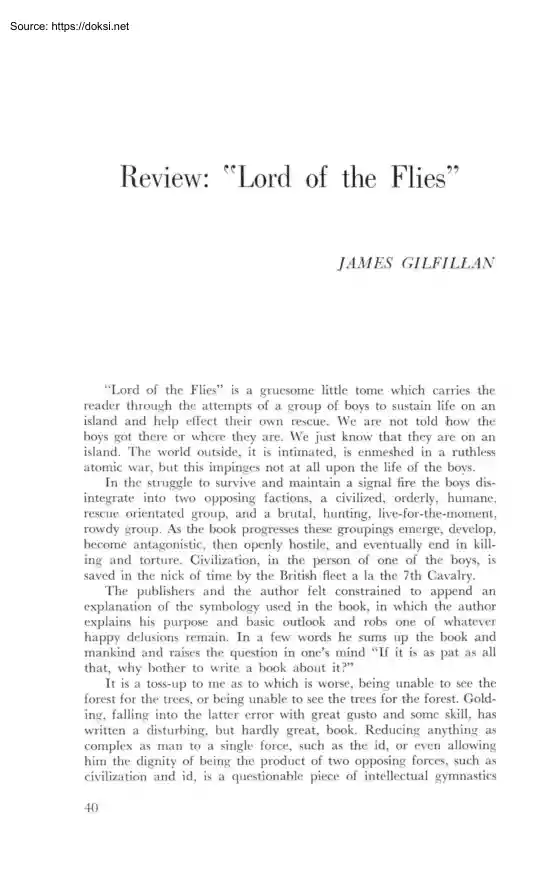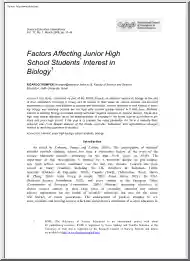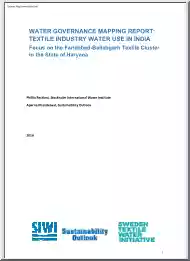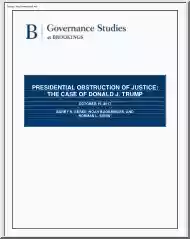Comments
No comments yet. You can be the first!
What did others read after this?
Content extract
Review: ~~ Lord of the Flies" ]AMES GI LFILLAN "Lord of the Fli es" is a gruesome little tome which carries th e reader through the a ttempts of a group of boys to sustain life on an island and help effect th eir own rescue. We are not told how the boys got th ere or wh ere they are. W e just know that they are on an island. The world outside, it is intima ted, is enmeshed in a ruthless atomic war, but this impinges not at all upon the life of the boys. In th e struggle to urvive a nd maintain a signal fire the boys disintegrate into two opposing factions, a civil ized, orderly, humane, rescu e orientated group, and a brutal, hunting, live-for-the-moment, rowdy group. As the book progresses these groupings emerge, develop, become a ntagoni stic, then openly ho tile, and eventually end in killing and torture. Civi liza tion, in the person of one of the boys, is saved in the nick of time by the British fl eet a Ia the 7th Cavalry. The publishers a nd the author felt
constrained to append an exp la nation of th e symbology used in the book, in which the a uthor explains his purpose and basic outlook a nd robs one of whatever happy delusions remain. In a few words h e sums up the book and mank ind and raises th e qu esti·on in one's mind " If it is as pat a all th a t, why bother to write a book about it?" It is a toss-up to me as to which is worse, being unable to see the forest for th e trees, or being unable to see the trees for the forest. Golding, falling into the la tter error with great gusto and some skill, has written a di sturbing, but hardly great, book. R educing anything as compl ex as man to a single force, such as the id, or even allowing him th e dignity of being the product of two opposing forces, such as civi liza tion and id, is a questionab le pi ece of intellectual gymnastics 40 and h as not provided an adequate underpinning for percepti ve literature in this case. Even measured by a single continuum
good-bad or productive-destructive, man fa lls all along the line. M easured by many continua he becomes a pretty complex being. It is one thing for a n author to follow his characters in their a ttempts to di scover and control, or fall before, the forces which control their uniqu e destinies. It is quite another thing to know all th e a nswers before the fact, as Golding does and ma ke cha racters puppet woodenly to such a n inh a rmonious duet as th e clash of good ( ?) a nd evil ( ?) . H e goes furth er and tells us we all function simi la rl y, which is a n effrontery up with which I wi ll not put. The a uthor or publishers defend th e major theme by calling on the gods of sociology, anthropology, psychology, and insightful a uthors of the past. It is Freud, however, who sta nds out most clearly as th e generator of the theories underlining th e work. R eferences to O edipus, and the general id, ego, super-ego interplay throughout the book convince one of the gui ding Freudia n
principles. If we grant th e id, ego, super-ego structure for Western civilized man must we concede further that it is inna te in man ? Golding does without a quiver. Is id, the life force, inherently destructive or does it become so as a result of social prohibitions? (I will say that th e impressions I have gleaned over the years from English a uthors wou ld almo t make what h appened on the island a predictabl e result o f the English school system, but not quite.) Why is id man ? Why id and not ego a nd super-ego? Is m a n what he is a t hi s worst ? If it is logical to say man a t his worst is man, is it not equally logical tha t man a t his best is m an ? How, if this basic life force is so destructive, does ma n survive? In such a rationale, how does th e author explain man's increase a nd success? Where do hum a nizing influ ences come from? Some supernatura l being, or do they come from th e same so urce th at the destructive forces do, man himself ? To return to Freud
for th e moment, Golding claims that th e orgiastic killing a nd eating of a sow, which takes pl ace in the book , is an O edipal wedding ritu a l which is a bit bewildering, for I thought it was papa we killed a nd symboli call y a te, not m ama. H e ·may have a thing about moth ers but h e and Freud p a rted com pany somewhere along the line. If we switch to a more anthropo logical or sociological point of vi ew, how modern is the concept of civilization as th e embodiment of that which is good, or just,, or positive? The natives of various cultures a round the world might indeed find it humorous to have the hunter culture depicted in a vi llainous, destru ctive lig ht in a fight against civilizing influences . Influences of a civilization which h as nearl y wiped their own cultures off the map in a completely ruthless fashion . (White C loud to Running Dear, " You must read 'Lord of the Flies,' the Indi ans almost win ." ) Thi s book reflect beautifull y Eu
ropean 41 colonial tho ught and reveals its a uthor for the truly conservative person he is. T here is a n odd little equa tion that exists in the minds of m en, a nd Golding is no exception. This equation is found by putting the continuum, order-freedom over the continuum, order-anarchy. One then interpolates; the "order" of th e order-freedom continuum, which m ean a n unnatura l authorita rian order, is equa ted with the "order" of th e order-anarchy continuum, which means a natural order, both productive and harmonious. Order equals order, therefore freedom equals ana rchy (for a na rchy one may read destruction, lust, rapine, or wh atever epithet satisfies the emotions best ). This type of thinking is on a par with the " A pi ece of bread is better than h eaven" syllogism a nd dominates the book. To go from the abstract to the more specific, Golding indicates early in the book th a t the destructive cha racteristi cs of the boys a re present from
th e start. J ack, the heavy, chunks his knife repeatedl y into trees and both the yo unger a nd o lder boys a re singularly indifferent to the feelings of the others a nd occasionally indu lge in meaningless mean acts toward s one a noth er. The a uthor asks us to accept these impulses as innate " na tural" manifesta tions covered over lightly by civiliza tion . At this point, a lesser man than h e would find himself at a n impasse. The older boys, having spent more time at it, would be more civilized and the younaer boys less. However, the you nger boys wou ld not h ave the power to act in the brute fashion against th e strength of the older boys and civilizing forces wou ld h ave remained evident a good while. Golding circumvented thi beautifully by th e simple expedi ent by having th e younger boys continu e to act like li ttle civilized leaderless kids while the older boys went n a tive. The hypothesis tha t these cruel streaks in the boys are outgrowths of a natural
inner structure is not pa rticularly good psychology. A better hypothesis in light of modern research wou ld be th at this cruelty is a result of a restrictive, puniti ve society. Inadvertently, J ack represents this thesis equally well with his learned a uthorita ri an approach towards hi s regimented fo llowers. (To claim that cru elty is na tural a nd order is civilized, produces odd thoughts about recent European hi story. This idea makes G erma ns less civilized than Englishmen a nd reduces what h appened recently in Algeria to a fi ction because, as every right thinking conservative knows the French are the most civ ilized of all ) There is really little more to say in this vein, for to do so is to treat the boys in the book as boys, which the author never did and the reader should not . They were not human a t all but at worst cardboa rd images a nd a t best symbolic things and images of things. Th ere is "civilized man" (R alph ) who, for reasons which entirely escape
me, rejects the offer of fri endship by " the intellectu al" (Piggy) . 42 There is the "mystic" (Simon ), the " natural, brutish man" (Jack) . We are relatively sure of these symbols for the author describes th em in the addenda. However, from this basic symbology on, th e reader may have a hard time staying with the au thor for th eir interp lay is inconsistent a nd periodically escapes normal experience altogether. Why was Piggy nearsighted? Does the author m ean to say that intelligence is nearsighted , or is it as he says that glasses were the way to represent the deterioration of the intellectual. Why was Simon the only one with courage? I always thought that courage went with the civilized man ; playing fields of Eton and all that sort of thing. Aren't mystics supposed to be closer to nature? If so, why is Simon one of the good guys? Simon is younger than J ack and R alph . I s mysticism more recent than civilization and brutality? Must
brutality work itself into a frenzy to kill food? With spears yet? Have even symbolic kids given up pit digging as a way to trap animals? Qu estion after question a rises as the symbols go clanking a nd lurching along their preordained paths. Th e story did not move in a human ly rational world though it did move with a certain logic from event to event. In short, it was highly contrived to complete the authors prejudged plan. So contrived was it that it was difficult to work up an appropria te feeling of horror when Piggy came a cropper a nd smeared himself over a rock, or when Simon became the sacrificial beast. The inh abita nts of the island were never a llowed to develop as people but were locked in symbolic roles and as such lost th eir human identity and appeal. This is a scare book and succeeded in this to the extent that I did feel disquieted when it was done. The sou rce of my apprehension, however, is not that whi ch the a uthor intend ed. I am not nearly as afraid of a n
inherent evil in man as I am of what the people who believe in original sin want to do about it. If we impose more civilization and repress natural drives more stringently, we will, I'm certain , increase th e intensity of whatever is hostil e in man. Since time began it has always been, "M a n is inh erently evil and we-not h e-m ust do something about it," and the something is usually repressive and controlling and forces man to maintain, destructively at times, hi s right to be himself, growing and infinitely more comp lex tha n Golding ever dreamed him to be. 43
constrained to append an exp la nation of th e symbology used in the book, in which the a uthor explains his purpose and basic outlook a nd robs one of whatever happy delusions remain. In a few words h e sums up the book and mank ind and raises th e qu esti·on in one's mind " If it is as pat a all th a t, why bother to write a book about it?" It is a toss-up to me as to which is worse, being unable to see the forest for th e trees, or being unable to see the trees for the forest. Golding, falling into the la tter error with great gusto and some skill, has written a di sturbing, but hardly great, book. R educing anything as compl ex as man to a single force, such as the id, or even allowing him th e dignity of being the product of two opposing forces, such as civi liza tion and id, is a questionab le pi ece of intellectual gymnastics 40 and h as not provided an adequate underpinning for percepti ve literature in this case. Even measured by a single continuum
good-bad or productive-destructive, man fa lls all along the line. M easured by many continua he becomes a pretty complex being. It is one thing for a n author to follow his characters in their a ttempts to di scover and control, or fall before, the forces which control their uniqu e destinies. It is quite another thing to know all th e a nswers before the fact, as Golding does and ma ke cha racters puppet woodenly to such a n inh a rmonious duet as th e clash of good ( ?) a nd evil ( ?) . H e goes furth er and tells us we all function simi la rl y, which is a n effrontery up with which I wi ll not put. The a uthor or publishers defend th e major theme by calling on the gods of sociology, anthropology, psychology, and insightful a uthors of the past. It is Freud, however, who sta nds out most clearly as th e generator of the theories underlining th e work. R eferences to O edipus, and the general id, ego, super-ego interplay throughout the book convince one of the gui ding Freudia n
principles. If we grant th e id, ego, super-ego structure for Western civilized man must we concede further that it is inna te in man ? Golding does without a quiver. Is id, the life force, inherently destructive or does it become so as a result of social prohibitions? (I will say that th e impressions I have gleaned over the years from English a uthors wou ld almo t make what h appened on the island a predictabl e result o f the English school system, but not quite.) Why is id man ? Why id and not ego a nd super-ego? Is m a n what he is a t hi s worst ? If it is logical to say man a t his worst is man, is it not equally logical tha t man a t his best is m an ? How, if this basic life force is so destructive, does ma n survive? In such a rationale, how does th e author explain man's increase a nd success? Where do hum a nizing influ ences come from? Some supernatura l being, or do they come from th e same so urce th at the destructive forces do, man himself ? To return to Freud
for th e moment, Golding claims that th e orgiastic killing a nd eating of a sow, which takes pl ace in the book , is an O edipal wedding ritu a l which is a bit bewildering, for I thought it was papa we killed a nd symboli call y a te, not m ama. H e ·may have a thing about moth ers but h e and Freud p a rted com pany somewhere along the line. If we switch to a more anthropo logical or sociological point of vi ew, how modern is the concept of civilization as th e embodiment of that which is good, or just,, or positive? The natives of various cultures a round the world might indeed find it humorous to have the hunter culture depicted in a vi llainous, destru ctive lig ht in a fight against civilizing influences . Influences of a civilization which h as nearl y wiped their own cultures off the map in a completely ruthless fashion . (White C loud to Running Dear, " You must read 'Lord of the Flies,' the Indi ans almost win ." ) Thi s book reflect beautifull y Eu
ropean 41 colonial tho ught and reveals its a uthor for the truly conservative person he is. T here is a n odd little equa tion that exists in the minds of m en, a nd Golding is no exception. This equation is found by putting the continuum, order-freedom over the continuum, order-anarchy. One then interpolates; the "order" of th e order-freedom continuum, which m ean a n unnatura l authorita rian order, is equa ted with the "order" of th e order-anarchy continuum, which means a natural order, both productive and harmonious. Order equals order, therefore freedom equals ana rchy (for a na rchy one may read destruction, lust, rapine, or wh atever epithet satisfies the emotions best ). This type of thinking is on a par with the " A pi ece of bread is better than h eaven" syllogism a nd dominates the book. To go from the abstract to the more specific, Golding indicates early in the book th a t the destructive cha racteristi cs of the boys a re present from
th e start. J ack, the heavy, chunks his knife repeatedl y into trees and both the yo unger a nd o lder boys a re singularly indifferent to the feelings of the others a nd occasionally indu lge in meaningless mean acts toward s one a noth er. The a uthor asks us to accept these impulses as innate " na tural" manifesta tions covered over lightly by civiliza tion . At this point, a lesser man than h e would find himself at a n impasse. The older boys, having spent more time at it, would be more civilized and the younaer boys less. However, the you nger boys wou ld not h ave the power to act in the brute fashion against th e strength of the older boys and civilizing forces wou ld h ave remained evident a good while. Golding circumvented thi beautifully by th e simple expedi ent by having th e younger boys continu e to act like li ttle civilized leaderless kids while the older boys went n a tive. The hypothesis tha t these cruel streaks in the boys are outgrowths of a natural
inner structure is not pa rticularly good psychology. A better hypothesis in light of modern research wou ld be th at this cruelty is a result of a restrictive, puniti ve society. Inadvertently, J ack represents this thesis equally well with his learned a uthorita ri an approach towards hi s regimented fo llowers. (To claim that cru elty is na tural a nd order is civilized, produces odd thoughts about recent European hi story. This idea makes G erma ns less civilized than Englishmen a nd reduces what h appened recently in Algeria to a fi ction because, as every right thinking conservative knows the French are the most civ ilized of all ) There is really little more to say in this vein, for to do so is to treat the boys in the book as boys, which the author never did and the reader should not . They were not human a t all but at worst cardboa rd images a nd a t best symbolic things and images of things. Th ere is "civilized man" (R alph ) who, for reasons which entirely escape
me, rejects the offer of fri endship by " the intellectu al" (Piggy) . 42 There is the "mystic" (Simon ), the " natural, brutish man" (Jack) . We are relatively sure of these symbols for the author describes th em in the addenda. However, from this basic symbology on, th e reader may have a hard time staying with the au thor for th eir interp lay is inconsistent a nd periodically escapes normal experience altogether. Why was Piggy nearsighted? Does the author m ean to say that intelligence is nearsighted , or is it as he says that glasses were the way to represent the deterioration of the intellectual. Why was Simon the only one with courage? I always thought that courage went with the civilized man ; playing fields of Eton and all that sort of thing. Aren't mystics supposed to be closer to nature? If so, why is Simon one of the good guys? Simon is younger than J ack and R alph . I s mysticism more recent than civilization and brutality? Must
brutality work itself into a frenzy to kill food? With spears yet? Have even symbolic kids given up pit digging as a way to trap animals? Qu estion after question a rises as the symbols go clanking a nd lurching along their preordained paths. Th e story did not move in a human ly rational world though it did move with a certain logic from event to event. In short, it was highly contrived to complete the authors prejudged plan. So contrived was it that it was difficult to work up an appropria te feeling of horror when Piggy came a cropper a nd smeared himself over a rock, or when Simon became the sacrificial beast. The inh abita nts of the island were never a llowed to develop as people but were locked in symbolic roles and as such lost th eir human identity and appeal. This is a scare book and succeeded in this to the extent that I did feel disquieted when it was done. The sou rce of my apprehension, however, is not that whi ch the a uthor intend ed. I am not nearly as afraid of a n
inherent evil in man as I am of what the people who believe in original sin want to do about it. If we impose more civilization and repress natural drives more stringently, we will, I'm certain , increase th e intensity of whatever is hostil e in man. Since time began it has always been, "M a n is inh erently evil and we-not h e-m ust do something about it," and the something is usually repressive and controlling and forces man to maintain, destructively at times, hi s right to be himself, growing and infinitely more comp lex tha n Golding ever dreamed him to be. 43





